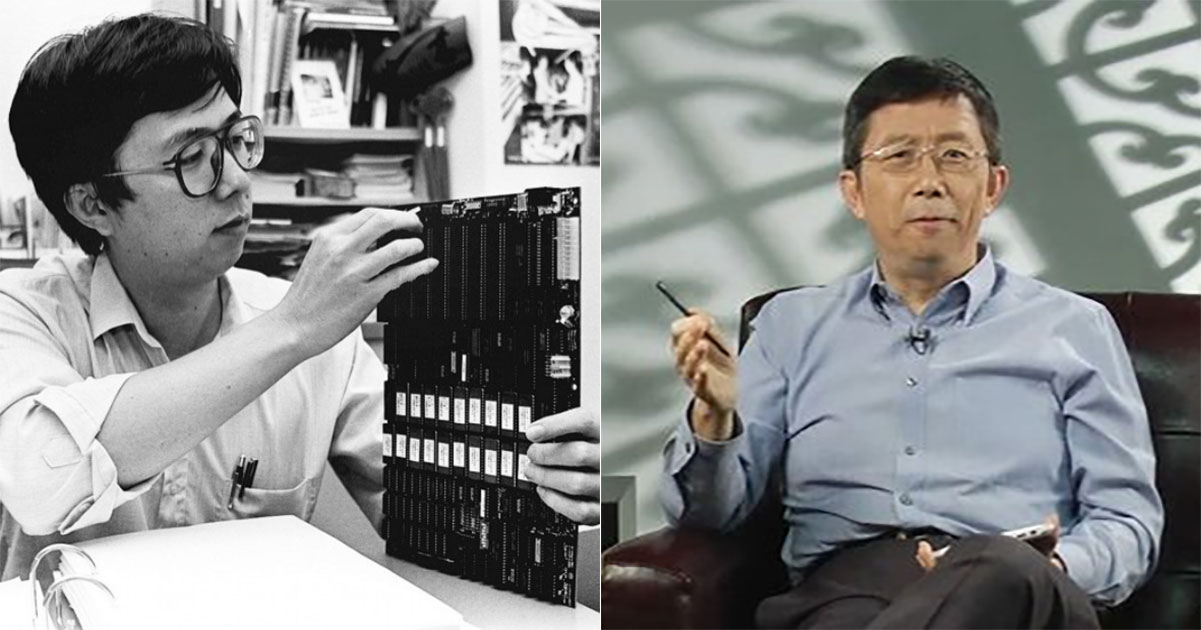Follow us on Telegram for the latest updates: https://t.me/mothershipsg
Sim Wong Hoo, founder, CEO and chairman of Creative Technology, passed away on Jan. 4, aged 67.
An inventor and entrepreneur, Sim left behind a legacy in the IT industry with his products developed under Creative.
From humble beginnings in a kampung, to starting Creative as a computer repair shop, to winning a legal lawsuit against Apple, Sim took Singapore-made technology and innovation to the global stage and carved out a place for it in the spotlight.
Humble beginnings
Born in a family of 12, Sim was the 10th child.
He grew up in a kampung in Bukit Panjang.
He received an electrical and engineering diploma in 1975 at Ngee Ann Technical College (now known as Ngee Ann Polytechnic).
In July 1981, Sim founded Creative with a former schoolmate in the form of a computer repair shop in Chinatown.
From there, he developed and sold an add-on memory board for the Apple II computer.
In 1989, Creative developed the stand-alone sound card Sound Blaster, which was among the first dedicated audio processing card.
In 1992, Creative became the first Singapore company listed on Nasdaq, the world's second-largest stock exchange.
Creative's most notable products are the Sound Blaster and the Creative Zen range.
A significant contribution of his was the electronic Chinese dictionary, which helped students in Singapore with their Chinese examinations.
Achievements and accolades
By 2000, Sim became Singapore's youngest billionaire at 45 years old.
His other notable achievements included:
- winning the Bintang Bakit Masyarakat (Public Service Star) in 2001
- being the first person to be named twice as Singapore's Businessman of the Year in 1992 and 1997
- being named Person of the Year by the Singapore Computer Society in 2002
No U-Turn Syndrome
Perhaps one of his most significant achievements was coining and popularising the term "No U-Turn Syndrome" (NUTS) in his book, "Chaotic Thoughts from the Old Millennium".
NUTS is a term used to describe the social behaviour of Singaporeans, who have the propensity of asking authorities for permission before proceeding with any actions.
Sim used the analogy of the traffic rules of Singapore, where drivers are not allowed to make a U-turn, unless a sign explicitly stated so, to describe this behaviour.
He compared it to other countries where drivers may make U-turns freely, as long as there is no "no U-turn" sign.
Sim used this analogy to explain the red tape that he encountered when dealing with bureaucrats -- a phenomenon that he felt stifled the creativity of Singaporeans, which the government has been trying to promote.
NUTS is also a criticism of the strict education system in Singapore, where students are taught from a young age to obey instructions without questioning decisions.
Won a legal battle against Apple
In 2006, Creative sued Apple, claiming the iPod maker infringed on its patent for the interface that Creative used for its Zen music players.
Apple countersued, alleging that Creative infringed on Apple's patents for user interfaces.
The legal battle ended when Apple agreed to settle with Creative for US$100 million.
In an interview with CNBC, Sim spoke about the lessons he learned from the experience and the process behind the legal battle.
"It was something we had to do because Apple did not just... infringe our patent. Actually, Steve came to our booth, saw our products and liked the product. He saw the future of Apple there," Sim said, while sharing about his encounter with the late founder of Apple, Steve Jobs.
When clarifying how Jobs saw the future of Apple, Sim said Jobs asked people from Creative to go to the Apple headquarters to present to him.
"Our people went to look for some collaboration... He was trying to work something together, then, of course, that didn't happen, and he just copied what we did," Sim said.
Sim was asked if there was anything he could learn from Apple, and he replied that it was to "learn from this event".
Advice to entrepreneurs
In an interview with Yahoo, Sim advised budding entrepreneurs not to get married.
"Once you have family and commitment, you cannot afford to take risks. I can take risks because I have no family. In the early days, I survived on S$200 a month," Sim said.
Sim said entrepreneurs need to take risks, or "nothing happens".
"You need to face the consequences of your mistakes and learn from your mistakes. If you do not make mistakes, you won't learn anything and you won't grow up."
Top photos from Facebook
If you like what you read, follow us on Facebook, Instagram, Twitter and Telegram to get the latest updates.
